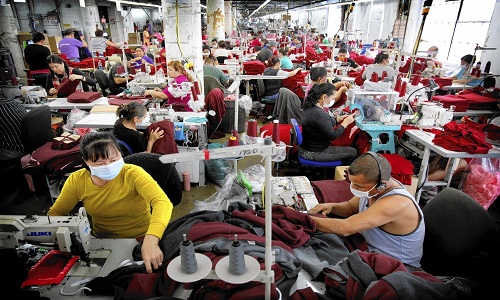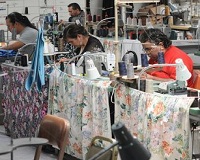"North Carolina, with 42,000 employed in 700 textile or apparel factories, has the largest textile mill industry in the US, says state’s Economic Development Partnership Organization (EDPNC). The EDPNC recruits US and foreign textile firms (among other industries) to invest in the state, marketing its integrated supply chain. While automation has become an essential part of the process, it can actually boost employment, explained Dan St Louis, executive director of Manufacturing Solutions Center, a non-profit in Conover, North Carolina focused on R&D, innovative technology, testing and incubator services for the apparel and textile industries."
North Carolina, with 42,000 employed in 700 textile or apparel factories, has the largest textile mill industry in the US, says state’s Economic Development Partnership Organization (EDPNC). The EDPNC recruits US and foreign textile firms (among other industries) to invest in the state, marketing its integrated supply chain. While automation has become an essential part of the process, it can actually boost employment, explained Dan St Louis, executive director of Manufacturing Solutions Center, a non-profit in Conover, North Carolina focused on R&D, innovative technology, testing and incubator services for the apparel and textile industries.

If an automated machine can increase production as a part of an effort to add more customers, then it can actually create jobs. In apparel sector, a company would have to add more sewers to keep up with increased production. Yet many manufacturers complain they can’t recruit qualified technicians or sewers because of the lingering and clichéd ‘sweatshop’ image that follows the textile industry.
Textile giants like Hanes, VF Corp and Gildan have headquarters in North Carolina, but they have moved their production offshore. The state lost thousands of jobs since the mid-1990s, a trend which started with the North Atlantic Free Trade Agreement (NAFTA). NAFTA, plus many other agreements such as Most Favored Nation (MFN) status from the World Trade Organization that eased trade restrictions from certain countries, on top of low labour wages in developing countries also fuelled offshore production. Because of these developments, local manufacturers were forced to compete with cheaper imports.
But Cluster Mapping has different facts to reveal. It says, textile jobs in North Carolina actually rose nearly 3 per cent between 2014 and 2015. Apparel jobs, however, fell just over 5 per cent for the same period. Burlington, part of ITG, has three factories weaving worsted wool and synthetic fabrics for clients including Brooks Brothers and the American army, which is restricted from procuring clothing that is not made in the US, among others. Brooks Brothers produces 6,000 button-down shirts weekly at its own Garland, North Carolina factory that currently employs 188 people — in a town of roughly 620 inhabitants — and is adding a third assembly line which should bring the employee count to over 200. The company is trying to develop a luxury performance knit with North Carolina mills for sports polo shirts and plans to make them in-state. This is part of the company’s drive to increase its ‘Made in America’ footprint.
Emphasis on ‘Made in US’
American Giant, the San Francisco-based maker of 100 per cent American-made sportswear recently bought three cut and sew factories in North Carolina to keep up with demand for its original product launched in 2012, an $89 cotton-fleece hoodie, and other goods. Two factories are expanding while the third is on hold, slated for a confidential 2018 joint venture. American Giant’s mid-range prices show that North Carolina and the US are capable of producing ‘exceptional product at a fair price’, not just high-end goods, said founder and chief executive Bayard Winthrop.
Then, there are multimillion-dollar investments from foreign entities into North Carolina. Dr David Hinks, Dean of the College of Textiles at North Carolina State University points out Sri Lanka-based MAS Holdings’ $20 million acquisition this year of Asheboro’s Acme-McCrary, a 108-year-old maker of hosiery, seamless apparel and active wear, and Taiwan’s Everest Textiles, a performance fabrics maker building an $18.5 million factory in Forest City. The state offers incentives to outside investors in the form of grants, worker training or tax benefits. There has been increasing interest by companies investing back into the US in textiles and apparel, especially in North Carolina.
What works for North Carolina
An Ipsos/Reuters study ‘Buy America’ conducted last spring shows, for 70 per cent of Americans Made in America goods are important to them. According to this year’s ‘Made in Country Index’ from Statista, US goods ranked No. 1 in reputation for consumers in six Latin American countries along with India, Egypt and the Philippines; and Made in the USA ranks 8th in the world.
With expectation for a fast response brands have to deliver quickly, which makes it essential for them to produce in the vicinity to avoid logistical delays. Moreover, manufacturers are exploring a new paradigm of reducing inventory liabilities and producing faster turnaround in place of the old model of a six-month manufacturing and delivery calendar. Offshore production can’t respond accordingly and North Carolina’s historical supply chain, among other textile manufacturing regions, can.













